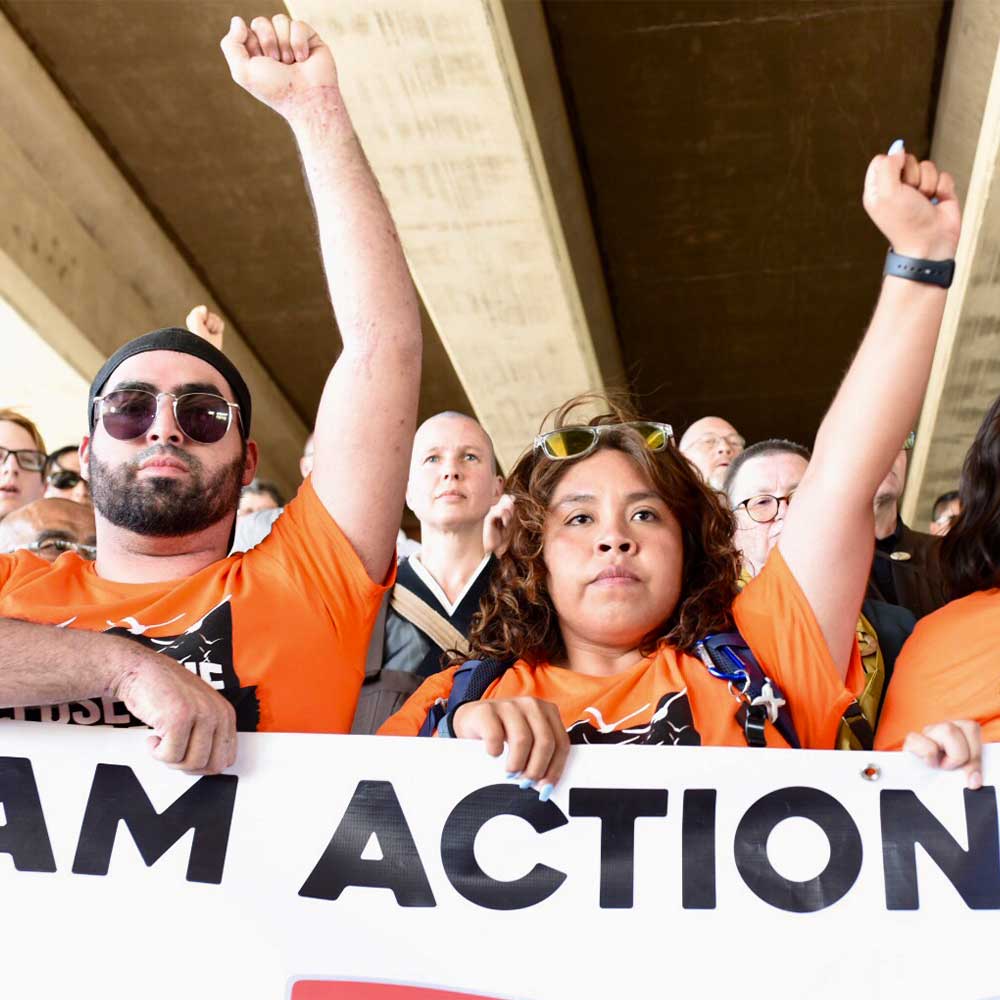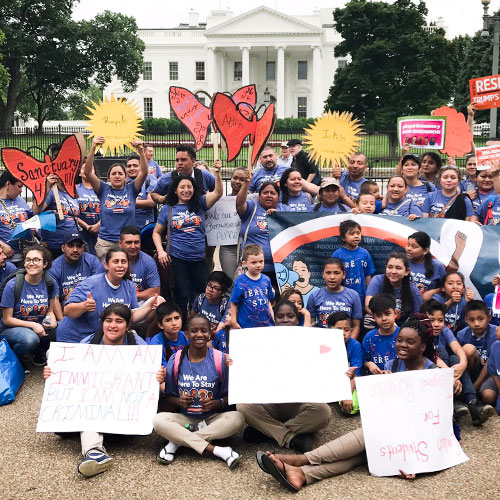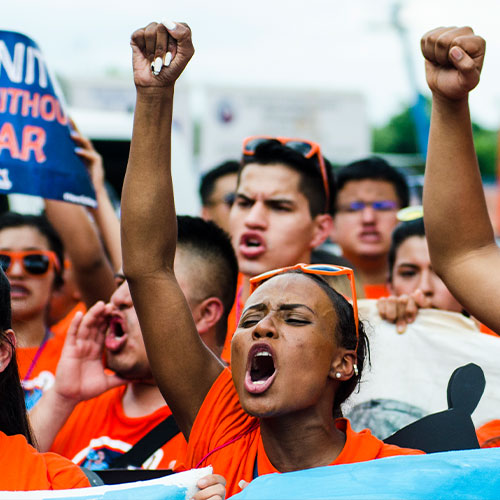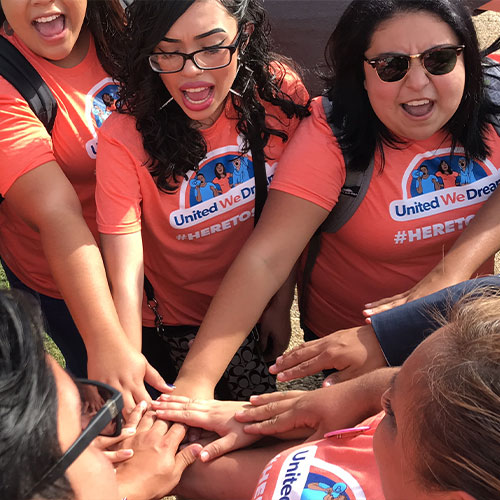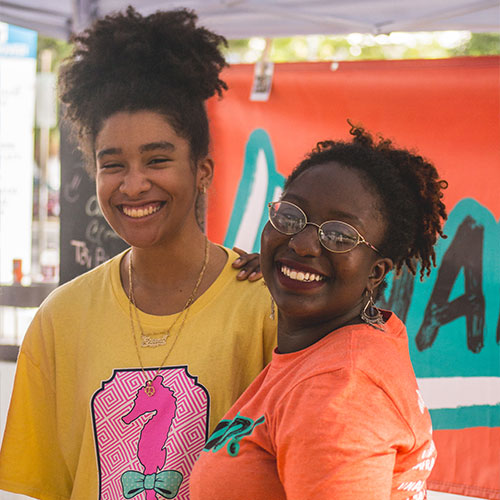Washington, D.C.– Heartbreaking and alarming news surfaced this week of 11-year-old Jocelynn Rojo Carranza who took her own life earlier this month after facing cruel and relentless bullying from her classmates over her family’s immigration status. Jocelynn lived in Gainesville, Texas with her family.
Bruna Sollod, Senior Political Director of United We Dream, said:
“We are heartbroken to learn of Jocelynn Rojo Carranza’s death. Like all children, Jocelynn deserved to grow up and feel safe in her community, especially in her school. We are shattered knowing that Trump’s anti-immigrant lies and policies led to her being bullied and ultimately made her feel like her life was anything less than precious.
Trump and his MAGA allies’ are directly responsible for this preventable tragedy. They continue to normalize hate, and minimize the consequences of terrorizing immigrants, kidnapping them from their homes and unleashing the military against communities across the country. Just in the past weeks, official White House digital accounts have posted memes threatening to abduct immigrants, as well as a dehumanizing ASMR video showing them laying out chains and boarding people onto deportation flights. Their vile, anti-immigrant crusade has placed a target on the backs of millions of individuals and families. They’ve emboldened many more to spread hate and bigotry, in schools, in neighborhoods and throughout the places we call home. Tragically, children like Jocelynn, are paying the consequences with their lives. We demand elected officials across Texas, including Representative Ronny Jackson (TX-13), immediately and strongly condemn this violence and take urgent steps to create protections for immigrants now.”
Germán Cadenas, PhD, Associate Professor of Clinical Psychology at Rutgers University, said:
“The tragic loss of Jocelyn Rojo Carranza is deeply saddening and it deserves to be honored and mourned. Her loss reflects the danger of a growingly hostile climate against immigrants in the U.S. Research shows that anti-immigrant discrimination is linked to detrimental mental health outcomes among young people, and that anti-immigrant policies also negatively impact people who hold a range of immigration statuses. Jocelyn’s loss also highlights the critical role that schools can play to promote the safety and wellbeing of all children. There are strategies that schools can put into place to create an environment of mental health equity for immigrant students, including culturally responsive school mental health interventions. It is also key that schools offer programs with learning opportunities for all youth and families to better understand immigration policies and learn about their rights. Our research with the organization, Immschools, is showing that young people report greater mental health after participating in these programs compared to youth who did not participate in a program like this. Our policymakers, education leaders, and communities can do better to prevent future tragedies like this one.”
Linda Corchado, Senior Director of Immigration at CHILDREN AT RISK, said:
“Jocelynn Rojo Carranza’s story is a tragic reminder that our words and actions have the power to save lives or shatter them. Deportation is not some abstract public policy to enforce our borders or to keep our communities safe, deportation is segregation in America, it is the process of deciding which one of us are worthy of having a whole and happy life and which one of us are not. Deportation is cruel and now, children in America, children like Jocelynn, are subject to the constant fear of it. Importantly, schools should be a place of comfort and belonging where children learn to dream and receive the tools to build out those dreams. Our schools fail when we fail to provide these basic safeguards and our communities fail when we fail children like Jocelynn. While the fears that permeated the life of Jocelynn were about immigration, really, none of this is about immigration and all of this is about who we are when the most vulnerable amongst us are forgotten and trampled upon. Here in Texas, we will not forget Jocelynn. We must be better than this, for her memory and for millions of children just like her who feel hopeless and alone in this nightmare.”
Trudy Taylor Smith, Esq., Senior Administrator for Policy and Advocacy of Children’s Defense Fund-Texas, said:
“Jocelynn’s tragic death is a predictable consequence of our nation’s current immigration enforcement policies that are intended to create extreme distress and fear for immigrant families. Family separation through the detention or deportation of a parent causes severe psychological harm and often puts a child’s physical health and safety at risk. Yet even if a child’s family is never separated, the perceived threat of immigration enforcement can create pervasive fear that takes a toll on a young person’s mental health and devastates their lifelong health, education, and earnings outcomes. Instead of targeting immigrant parents for deportation and expanding ICE’s authority to conduct raids in sensitive locations like schools, hospitals, and churches, our state and federal leaders should implement policies that protect a child’s right to grow up in a caring, stable family with a sense of safety and belonging.”
Isha Weerasinghe, Associate Director of Mental Health and Well-being at the Center for Law and Social Policy, said:
“All children need comprehensive support from their families and schools to maintain their well-being and safety. School administrators must acknowledge the impacts immigration policies are having on their students by denouncing all forms of bullying, and policymakers must be held accountable for the dire consequences that anti-immigrant policies are having on children’s mental health. An 11-year-old could be with her family today if the current Administration did not demonize immigrants and fuel hatred in communities.”
Viridiana Carrizales, Co-Founder and CEO of ImmSchools, said:
“As parents, we dream of seeing our children succeed and thrive. For many immigrant parents, the decision to come to this country is rooted in that very dream. Jocelynn’s tragic death is an unbearable loss, and we grieve for all that was taken from her. Every child—regardless of where they come from—is affected by the rising anti-immigrant climate, which is often felt most acutely in our schools. Let this be a wake-up call to every educator, every parent, and every one of us: Our children deserve schools and a country that are safe, welcoming, and full of opportunity. We will honor Jocelynn’s life by ensuring that our schools remain safe havens where all students—regardless of immigration status—can learn, grow, and thrive without fear.”
Melanie M. Domenech Rodríguez, Professor of Psychology, Utah State University
“Relationships can build people up or tear them down. The death of Jocelyn Rojo Carranza painfully amplifies the impact and consequences of rejection and exclusion. Rejection and exclusion have been documented as physically and socially painful for children and can permanently alter their developmental trajectories. Jocelyn was rejected and mocked by her peers for her perceived immigration status. There is a link between suicidality and belonging for immigrant youths. There are links between anti-immigrant sentiments and anti-immigrant policies and immigrant mental health. Jocelyn’s peers threatened to call ICE, compounding the exclusion with a threat to her core attachments and her personal sense of physical safety. All of these details are very connected to immigration narratives, however, the actions must be examined more broadly. This is a moment of reckoning for all adults in the United States to pay attention to the world we are creating and sustaining for our children. Are we preparing our children to build loving, connected communities that will sustain them beyond our lifetimes? Or are we creating fragmented islands of “us” and “them” that will leave them vulnerable and disconnected once their elders pass? Every time a child practices rejection, they strengthen their ability to reject others on any basis. Their ability to achieve connection is eroded by habits of exclusion. Rhetorics of exclusion don’t just hurt immigrant youth, they threaten the integrity of our whole communities by interrupting and deteriorating the creation of binds needed for future survival and wellness.”

